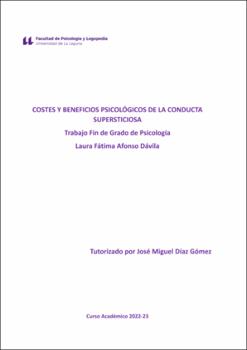Costes y beneficios psicológicos de la conducta supersticiosa.
Fecha
2023Resumen
La superstición es universal a todas las culturas alrededor del mundo, sin embargo,
su mediatización ha incrementado considerablemente en los últimos años. Es por
ello por lo que en el presente estudio se va a realizar una búsqueda exhaustiva de la
literatura de los últimos trece años, que pudieran darnos información sobre el
aprendizaje y las consecuencias de las conductas supersticiosas, así como su
impacto en el bienestar psicológico en la población adulta. Se realizó una revisión
sistemática en la que se estudió la literatura obtenida a través del buscador de la
BVS, desde el 2010 hasta el 2013. De los 50 resultados encontrados, se
seleccionaron 8 artículos definitivos y, utilizando el modelo de la declaración
PRISMA, se obtuvo que la superstición no está relacionada con el sexo biológico o
la situación educativa o laboral. Lo que sí se refleja es que el tipo de creencia
supersticiosa activada, consistente con la Paranormal Belief Scale (PBS), influye en
que se lleve a cabo la acción o no, siendo este el factor que contribuye al bienestar
psicológico. Aunque, independientemente del subtipo, el tener una predisposición a
la superstición supone un riesgo de rasgos y diagnósticos de psicopatología. Superstition is universal to all cultures around the world, however, its mediatization
has increased considerably in recent years. That is why in the present study an
exhaustive search of the literature of the last thirteen years will be carried out, which
could give us information about the learning and consequences of superstitious
behaviors, as well as their impact on the psychological well-being of the adult
population. A systematic review was carried out in which the literature obtained
through the VHL search engine from 2010 to 2013 was studied. Of the 50 results
found, 8 definitive articles were selected and using the PRISMA statement model, it
was obtained that superstition is not related to biological sex or educational or
employment status. What the results do reflect is that the type of superstitious belief
activated, consistent with the Paranormal Belief Scale (PBS), which influences
whether the action is carried out, this being the factor that contributes to
psychological well-being. Although, regardless of subtype, having a predisposition to
superstition poses a risk for traits and diagnoses of psychopathology.





